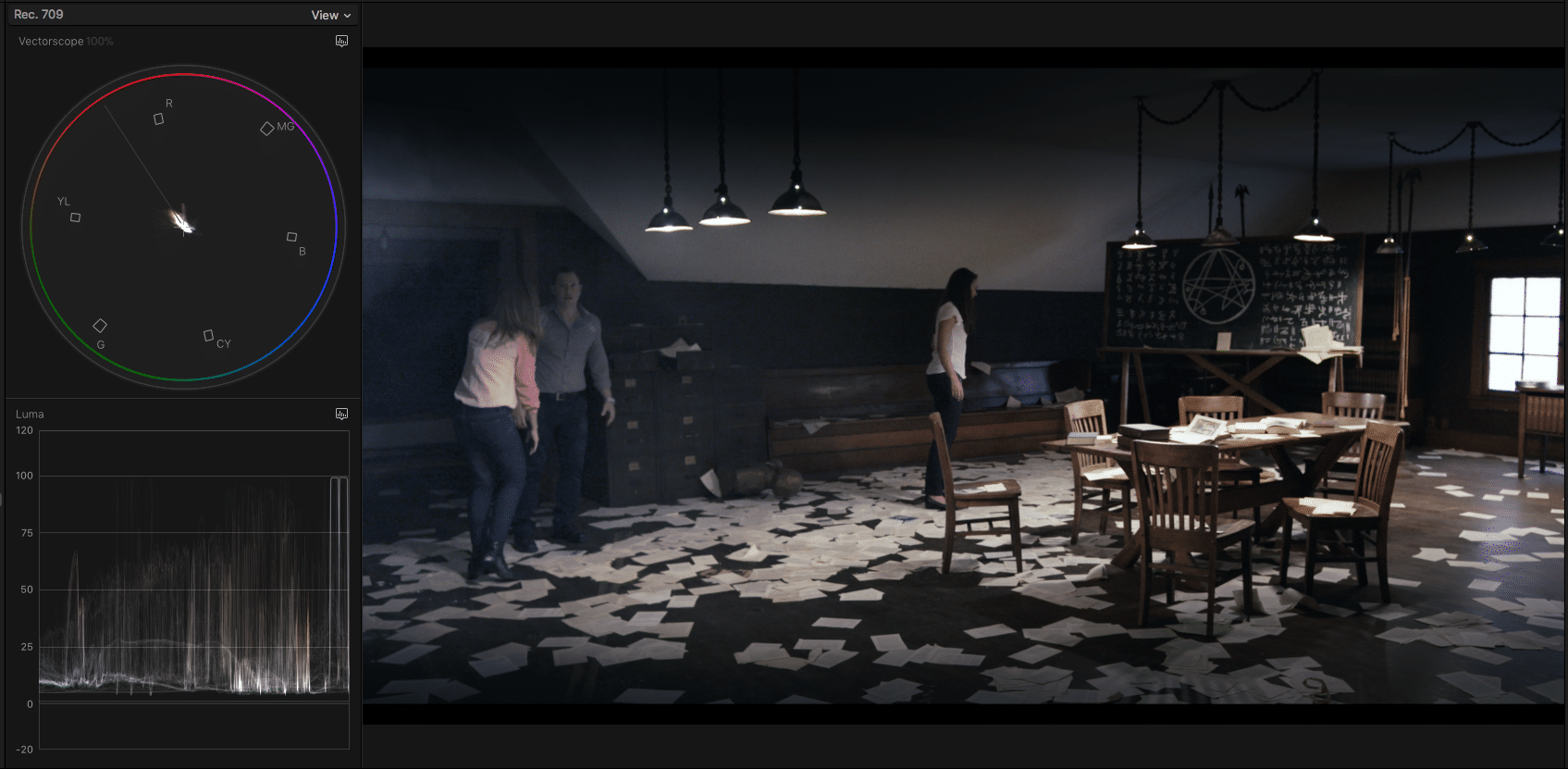Nathan is the owner of Blackwater Digital Services and has more than two decades of experience in motion picture quality control.
Quality Control (“QC”) is one of the most important parts of the post-production workflow, but one of the last things most independent filmmakers consider. The importance of a thorough and professional QC cannot be overstated since a QC rejection costs both time and money, and can make or break a film’s distribution deal or release. Passing QC ensures your film meets the specifications and requirements of broadcasters, distributors, sales agents and film festivals.
What is QC?
QC is a very thorough check of the final exported version of your content (usually a feature film or trailer). It should be scheduled once your editorial, color grading, visual effects, on-screen credits and final mix have all been completed and combined into the final master version of your feature or trailer. This master should be the latest version of your film and should, ideally, contain the final video as well as all channels of audio requiring QC.
By passing a 100% written QC from Blackwater Digital Services, you’ll have assurance that your master will be technically acceptable for virtually all destinations, worldwide. This includes all forms of Video on Demand (DirecTV, iNDemand, iTunes, Amazon Video, Netflix, etc), Home Video (Blu-ray or DVD), terrestrial or satellite broadcast, closed-net (airlines, cruise ships, hotels), online streaming and theatrical exhibition.
Once your master passes QC, it will be the main source for all future versions or formats of your film (like a DCP, Blu-ray, DVD, Online streaming version, etc.). Because this master is essentially the “starting point” for all future formats or versions of your film (called submasters), it is extremely important there are no technical issues with it, and also that the master turns out exactly as the filmmaker envisioned. Once your master is delivered to a distributor or sales agent it is out of your control, so you want to make sure they are working with the best possible (and correct) version.
What does QC check for?
There are multiple levels and types of QC. The most involved type of QC, which we refer to as “100% Written QC” (sometimes called a “Mastering QC”), is an extremely thorough check of the video, the audio, and the master container (usually a digital file). Each of these “streams” are checked separately in “passes.” At the end of the QC process, you’ll be provided with a detailed multi-page report outlining how your master is built, what issues exist with video or audio, and also calling out any potential mistakes or oversights made during earlier stages of post-production. Here are some examples of what a thorough QC checks for:
- Video: conversion or compression artifacting, production issues like equipment in shot, transfer issues, editorial issues, title/action safe issues, misspelled on-screen text, mixed aspect ratios, broadcast compliance, animation or render errors, data corruptions, etc.
- Audio: artifacting, production issues, compression issues, static, sync with video, drop outs, pops/ticks, broadcast compliance, etc.
Why is QC important?
There are several reasons why QC is strongly recommended (and often required) for your film:
- Filmmakers are often so wrapped up in working on their film that they may miss something a fresh set of eyes can catch. Just like a newspaper editor reviews an article that a columnist has been obsessing over for weeks, QC offers an objective “second opinion” about a film’s cut and mix.
- First time filmmakers may not be familiar with industry standard expectations or specifications for feature masters. The QC catches and educates filmmakers about those issues.
- The QC report will flag items that may potentially be a mistake so filmmakers can take a second look. This is particularly important since, during the post-production process, the director (or other creatives) may not be directly involved in some or all stages of post-production. As a result, those people may not be aware of changes or mistakes made by other members of their team. In that way, QC offers filmmakers an assurance that their original vision makes it to the screen as intended.
- Some technical issues can be magnified during handling, especially during conversion of your film from one format to another, or during screening. For instance, your film may look or sound ok in the edit bay on a 27″ screen, but when projecting that same film on a large silver screen in a theatre with high quality sound, a whole host of new issues may present themselves. This could be the difference between being an official selection at a festival vs. taking home the Jury Prize.
- Technical acceptance is a material condition of nearly all acquisition and distribution agreements. This means you will almost certainly be required to guarantee that your film is free of QC issues. There are several reasons for this requirement:
- Companies license films with the reasonable expectation that they will receive a good master to work with. In advance of a film’s release, those companies will spend money on artwork, advertising, marketing, and other promotion. If, after receiving delivery of your film, QC issues delay or force those companies to cancel the release, it may result in lost revenue or legal damages. Those liabilities could cost you, the filmmaker, exponentially more than a QC would have cost.
- Depending on the type of release, there are specific requirements about what should be included with your master. For instance, for foreign localization and dubbing, QC would check to make sure textless elements are present with the texted feature, and also that the M&E (Music and Effects tracks) are fully-filled and suitable for dubbing your film into a foreign language.

How much does QC cost?
Be wary of cheaper options! If it sounds too good to be true, it definitely is. QC is quite literally a “You get what you pay for” service. If you find a QC that costs hundreds less than the competition, it’s almost certainly because they are not as thorough, educated or experienced as a company charging industry-standard rates.
You can expect the QC process to take 3x the runtime of your asset, per pass. A separate pass is needed for each group of audio or video. So, for instance, a 90 minute film with Stereo audio would take 2 passes (one pass for video, one for audio). Each of those 2 passes would take 3×90 min, for a total of 9 hours (540 minutes) of facility time. High-quality QC is billed per hour of facility time, anywhere from $50 – $150 per hour (depending on the level of detail or type of QC).
Is QC an automated process?
At Blackwater Digital Services, all QC is completed by trained and experienced human technicians. On occasion, depending on the content and client needs, we may also use a high-end automated QC solution to check some aspects of an asset but, in the end, everything is always double checked and verified by human eyes and ears. We never rely solely on a software program to conduct QC. Automated QC can be quite good at detecting some things, but it can also misinterpret (or completely overlook) other things that only a human can evaluate properly.
What happens after I get my QC report?
Generally, once you receive your QC report, you should share it with all members of your post-production team and discuss how to address the issues. Items are either graded 1-3 or FYI and can be interpreted as follows:
1: Items graded ‘1’ are slight but may be noticeable to some viewers. It’s advised they be fixed, if possible, but fixing these items is not required for a passing grade.
2: Items graded ‘2’ are noticeable to some viewers and are considered borderline. This means they may be an issue for some distributors or destinations. As a result, fixing these items is strongly recommended, but fixes are not required.
3: Items graded ‘3’ are noticeable to most viewers and impact the quality of viewing. These items will lead to rejection from most destinations and fixes are required.
FYI: Items marked “FYI” are for informational purposes only and do not require correction. These items are flagged so filmmakers and other people handling the master are aware of their existence.
Some flagged items may be intentional, and that’s ok – you’ll just need to make a note of those items so they can be downgraded (given a passing grade), as appropriate. Once fixes are made and a new master is available, that new master should be sent back to Blackwater for a Spot QC. This Spot QC is a check of the new asset to make sure fixes were made properly and that those fixes did not cause any new issues. A Spot QC is not a full new QC, it is only a check of the spots specifically mentioned on the original report.
Can’t I just say all the issues are intentional?
Some flagged items may look or sound like mistakes even though they are actually intentional. Downgrading those items because they are intentional (like an artistic choice) is usually acceptable as long as it’s the truth, and as long as those items don’t violate technical requirements. However, classifying a flagged item as intentional does not necessarily mean you’re out of the woods. We can advise further about those specific situations.
Your master will almost certainly see one or more additional passes of QC as it passes through the distribution supply chain, on its way to consumers. For instance, if you deliver directly to a distributor, an encoding house will be checking your master before delivering it to destinations like iTunes or Netflix. An authoring house will be checking it before creating the DVD or Blu-ray. A broadcaster will be checking it before going to air. Because of these additional layers of QC, it is important to fix as much as possible, and have an accurate report noting what is intentional, so there aren’t QC rejections down the line. These additional QC checks are failsafe checks for good measure, they are not intended to be a substitute for the 100% QC filmmakers are expected to order prior to delivery.
What if I force something through QC? What’s the worst that could happen?
Sometimes filmmakers, because of budgetary or time restrictions, will try to force failed items through the QC process. Instead of fixing or improving issues, they will instruct the facility conducting the QC to downgrade flagged items on the report as best source or intentional, whether that is the case or not. However, if these notes are not legitimate, downgraded items are ultimately only hurting the filmmaker (and, potentially, the distributor).
Erroneously justifying failed items as artistic intent or best source will certainly lead to QC rejections down the line costing both time and money, and possibly exposing filmmakers to legal liability. Also, keep in mind that any changes to a feature master after delivery to a sales agent, distributor or broadcaster will necessitate re-mastering, re-delivery, and also may require updates of ancillary assets like closed captions or subtitles, submasters, dialogue lists, music cue sheets, clip cue sheets, or metadata. All of those revisions have a cost, and those costs can mount very quickly.
Please contact us for further information.
©2018 Nathan S. Ross and Blackwater Digital Services
https://www.blackwater.digital
